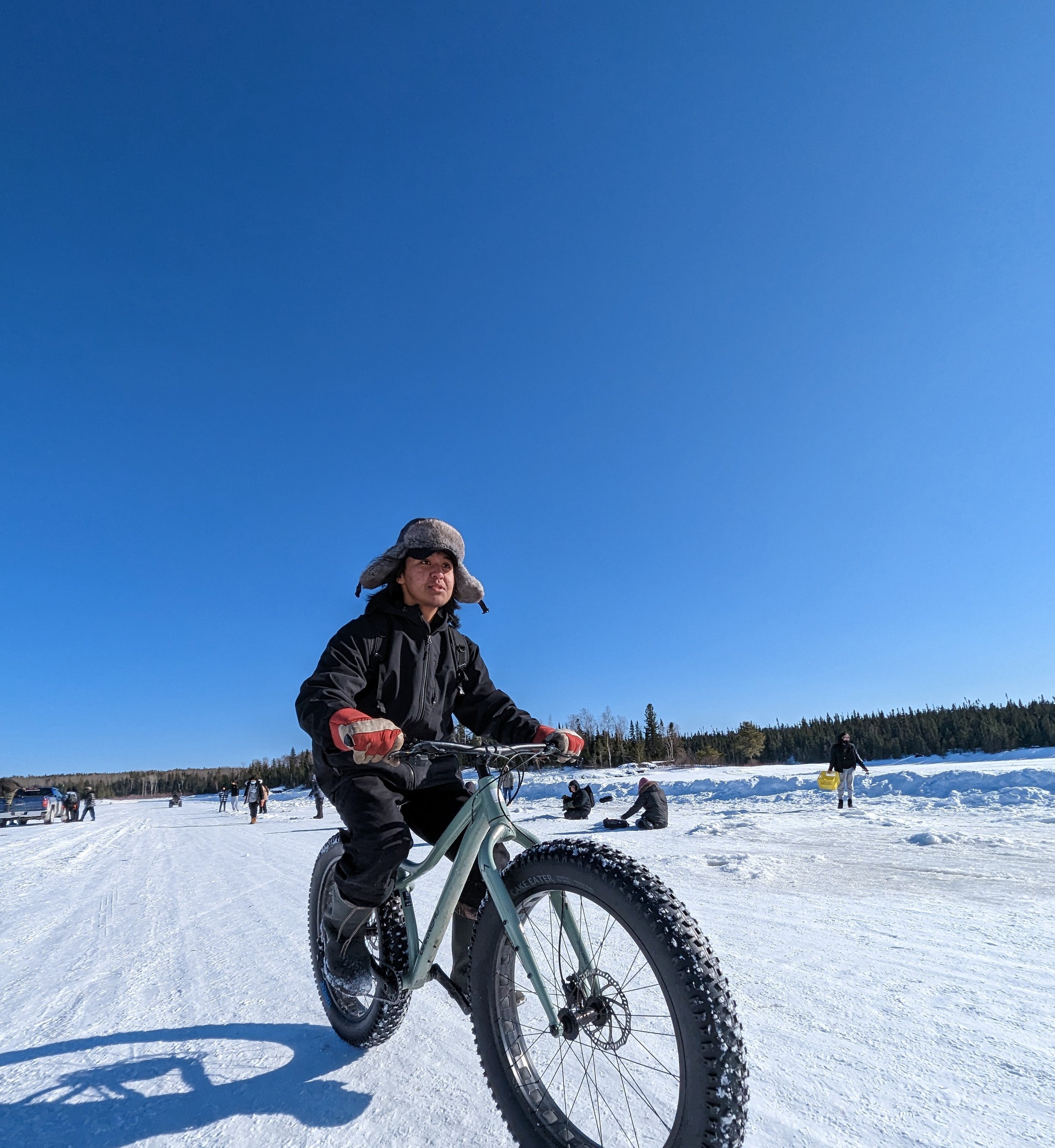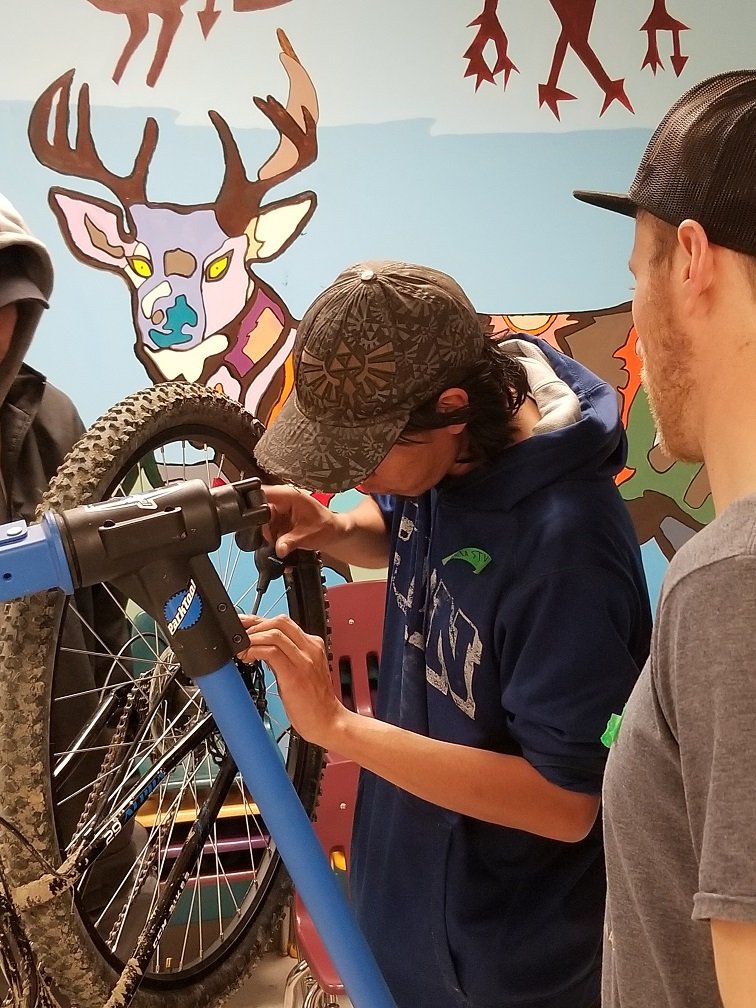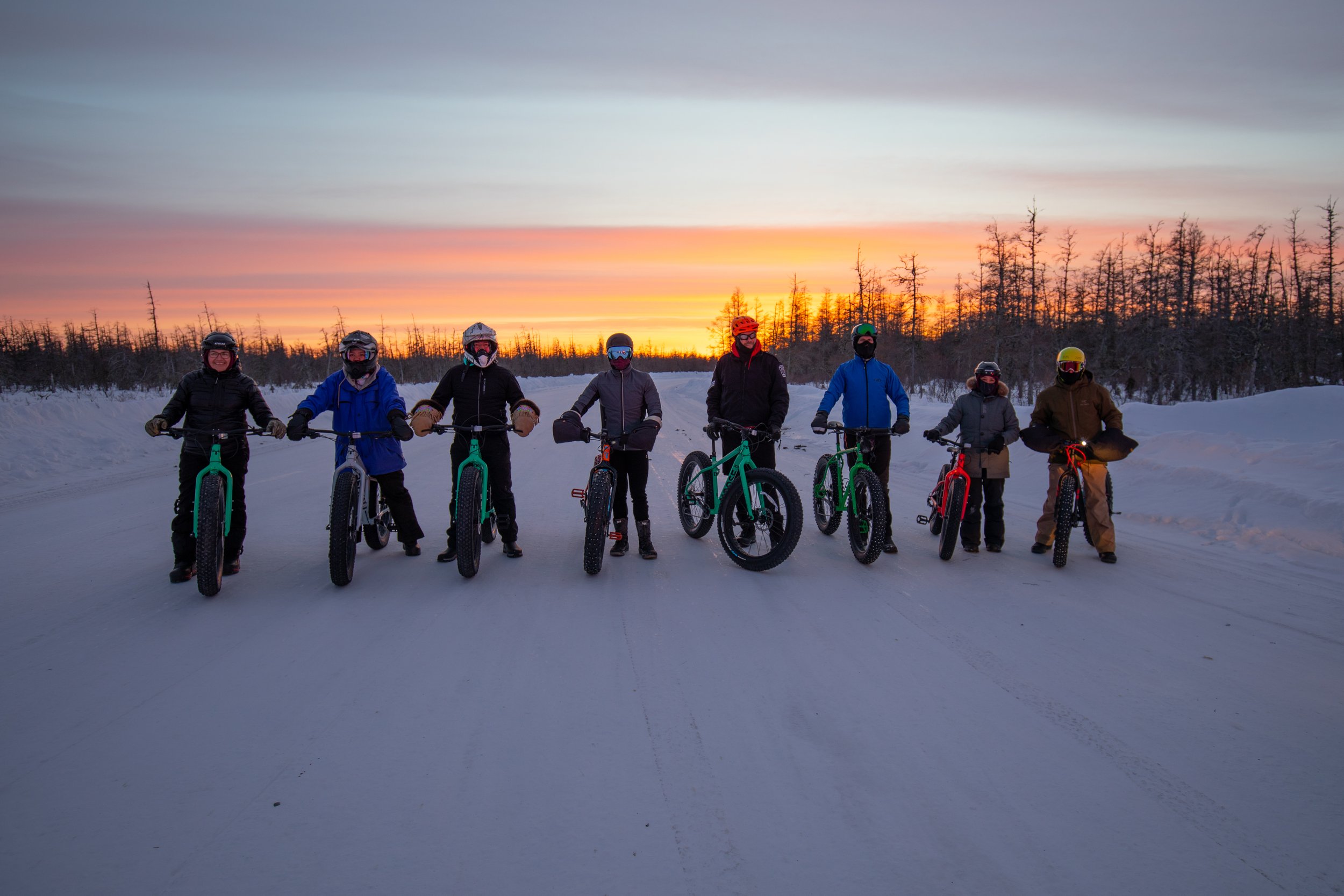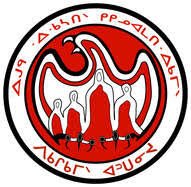Ice Road Challenge
January 23-26, 2025
The Ride:
The ride will cover approximately 125km in Northern Ontario, navigating snow, ice, and extreme cold conditions. The individual fundraising minimum for riders is $1000.
Location - Pikangikum First Nation.
Dates and Duration - On January 23, 2025 riders will travel by plane and then by bus to arrive at the starting location of Red Lake, Ontario. Friday, January 24 the epic fat bike ride leaves Red Lake for Pikangikum First Nation. Saturday, January 25, Ice Road Challenge participants are invited to celebrate the culture of Pikangikum First Nation through a variety of community led events. On Sunday, January 26, participants return home.
Support - This event is fully supported. Food, refreshments, medical support, and logistical support will be available from Red Lake to Pikangikum First Nation (Friday-Sunday). Riders are asked to bring some spending money to cover their meals on Thursday and Sunday evening.
Equipment - Riders MUST HAVE STUDDED TIRES. In addition to a fat bike, riders are responsible for bringing sufficient riding gear to address the cold temperatures. Studded tires are required to make the ride feasible.
Cost - Registration includes flights, accommodations, bus travel, and food costs. Early bird registration cost is $750 and ends December 5th at 11:55pm. Late registration is $850 and will close December 21st at 11:55pm. Participants are also expected to fundraise $1000.
Please call 905-807-8666 if you have any questions regarding registration. Or email us at info@newhopecommunitybikes.com
Fundraising:
The Ice Road Challenge is a fundraiser to support Indigenous Bike programming. Our goal is to raise $50,000!
Funds Raised will go towards:
Facilitating Ride Smart - a safe cycling program
Teaching bicycle mechanics
Updating shop tools
Employing youth in the bike shop, year-round
You are invited to support the Pikangikum First Nation Youth by signing up to ride, or, by donating to help us achieve our goal of $50,000 raised.
Learn more about the bike program in Pikangikum in the video below and on our website here:
FAQ's – Frequently Asked Questions
Q: Who can register for the rides?
A: Riders will need to be able to ride at a 15km/ hour pace and sustain that for approximately 30kms from check point to check point (remember the temperature and riding conditions), so know your capacity. If a rider is tired you will have the ability to take a break and be transported to the next check point. Once you pay the registration fee, we ask each rider to also fundraise.
Q: What is the elevation and speed like for the ride?
A: The terrain is northern Ontario, so flat with rolling hills along the frozen gravel road portions of the ride. We are aiming to keep the pace for the ride at 15km/h.
Q: Are there rest stops along the routes?
A: Yes, we will be stopping every 20-30 kms along the ride. A support vehicle with a trailer is available as a warming station and to access food. A pop-up privacy shelter will be available for washroom needs. If a break while riding is needed, there is the opportunity for riders to be transported by the support vehicle and transferred to the next stop.
Q: What should I wear for the ride?
A: You can expect to be riding in temps ranging from -15 to -25 without windchill, so what you wear is important!
Dress in layers with the ability to cover all exposed skin- including your face.
Quick tips: neoprene face mask with holes to cover your lower face and ski goggles works well to cover your eyes. Test out your rides leading up to the event so you know what layering requirements work best for you.
We strongly recommend winter footwear, warm winter boots.
Q: Do I need a helmet?
A: Yes, a helmet is required to ride in the Ice Road Challenge. Consider using a ski helmet for added warmth and comfort.
Q: Do I need to bring food?
A: Meals for Friday and Saturday are included in the registration fee along with Sunday breakfast and lunch.
Riders will need to bring money for Thursday lunch and Sunday night meals.
Snacks and hydration will be provided for the rides on Friday, but if you require special snacks or hydration during your ride, please bring those items with you.
Q: How are the riders getting to Red Lake?
A: Most of the travel and accommodation costs are built into the registration fee. We have taken care of all the travel plans. We will travel by plane on January 23 from Toronto to Winnipeg, and then take a bus to Red Lake. We will spend Thursday night in Red Lake and then complete the rides on Friday, January 24. On Saturday we will stay in the Pikangikum First Nation Community for the Winter Youth Festival. On Sunday, January 26, we will bus back to Winnipeg and fly back to Toronto for Sunday evening.
Q: How do I get my fat bike there?
A: We will be transporting your bike to Red Lake to meet you there; your bike will need to be boxed up and dropped off at a designated location prior to your departure north. In addition to moving your bike up a week before, we ask you pack a large gear bag (your winter riding gear, sleeping bag/mat can go in this) so that all the large items can be moved for you and you only need to bring a carry-on for the flight). We will send out an email with more details closer to the ride date.
Q: Do I need studs on my tires?
A: Yes. Studded tires are required for all bikes participating in the Ice Road Challenge.
Q: Is there an emergency management plan in place for the ride?
A: Yes. We have consulted with the local hospital and emergency services to provide an appropriate response to potential emergency situations. Medical support will be present for the duration of the event.
Q: What do accommodations look like - do I need to bring sleeping gear?
A: On the Thursday riders will stay overnight at the Super 8 hotel in Red Lake in shared room accommodations. Our overnight accommodations in Pikangikum (Friday and Saturday night) will be a gymnasium floor at Eenchokay Birchstick School. Riders should bring a sleeping bag, pillow, and consider a camping mattress for comfort.
Sponsors:
Ontario Provincial Police
The OPP are facilitating the transportation and movement of equipment and riders for this event.
Eenchokay Birchstick School
Supporting the youth organizers and teachers coordinating the Winter Festival.
Moose Bicycles
Chief Shirley Keeper and Council




















